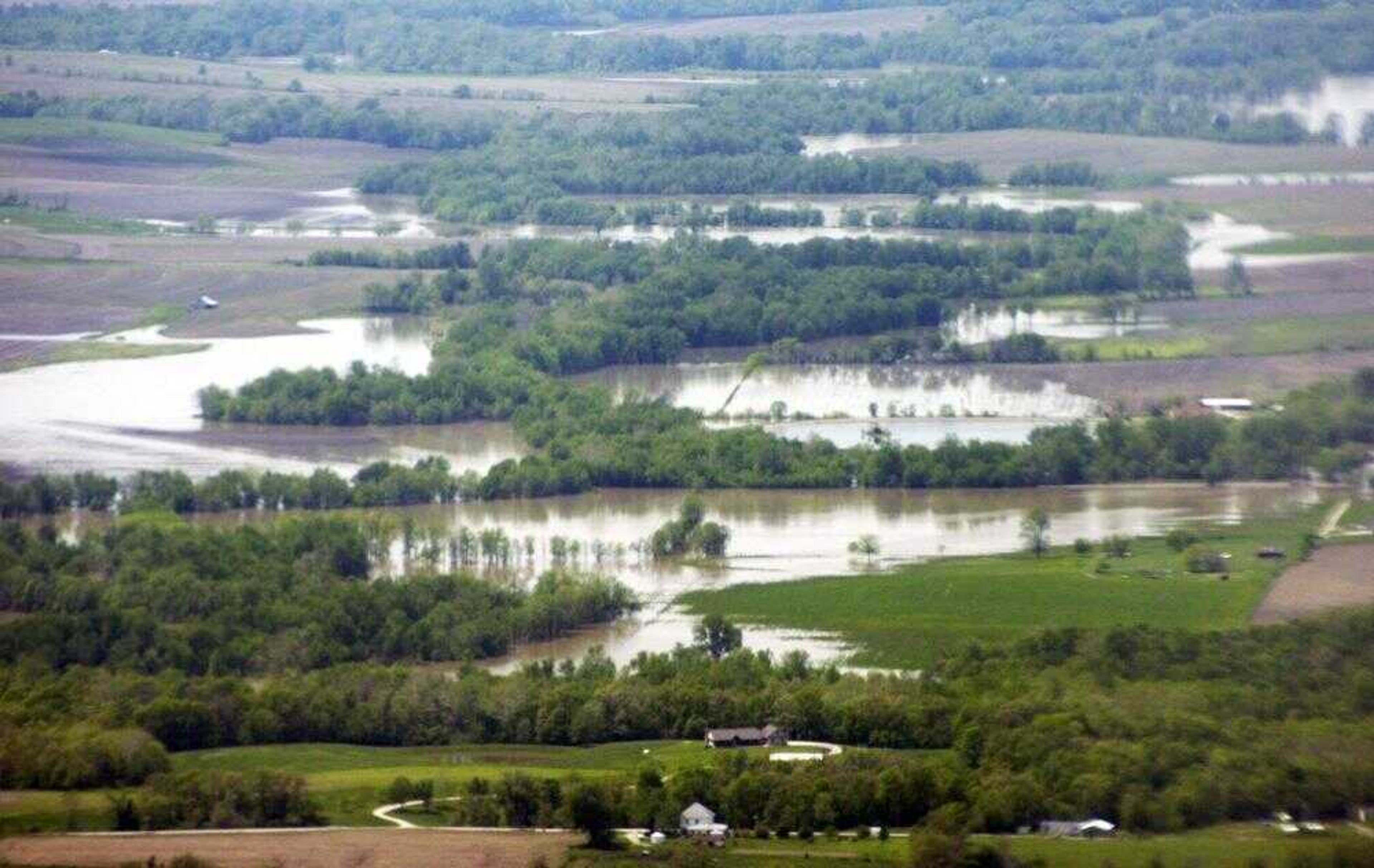Missouri River continues to rise
KANSAS CITY, Mo. -- Floodwaters continued to rise across northwest and central Missouri Wednesday, swallowing small towns like Big Lake and shutting down schools and businesses from Chillicothe to Jefferson City. The National Weather Service said it expected parts of the Missouri, Platte and Grand rivers, along with their tributaries, to remain at flood stage until the weekend, adding misery for property owners and spurring downstream residents to fill sandbags and move what they could to safety.. ...
KANSAS CITY, Mo. -- Floodwaters continued to rise across northwest and central Missouri Wednesday, swallowing small towns like Big Lake and shutting down schools and businesses from Chillicothe to Jefferson City.
The National Weather Service said it expected parts of the Missouri, Platte and Grand rivers, along with their tributaries, to remain at flood stage until the weekend, adding misery for property owners and spurring downstream residents to fill sandbags and move what they could to safety.
"We're trying to ensure communities are thinking about the water that's probably coming," said Gov. Matt Blunt, who has placed the National Guard on standby and was awaiting local requests for assistance.
The biggest problems are on the Platte and Grand rivers, where floodwaters were still rising to near historic levels.
The Platte River was expected to reach 36.3 feet at Sharp's Station, west of Platte City, on Thursday, just missing the record of 36.4 feet set during the massive floods in July 1993, said Julie Adolphson, a meteorologist with the National Weather Service in Pleasant Hill.

Adolphson said Platte City would see the river rise to 32 feet on Thursday, 12 feet above flood stage.
On the Grand River, Adolphson said water levels were already at 28.5 feet a mile west of Brunswick, well above the normal flood stage of 19 feet, and were expected to crest early Friday morning at 32.6 feet.
"It's going to get worse before it gets any better," she said.
The good news, she said, is there is no significant rain forecast for the region over the next few days, giving swollen creeks and streams time to return closer to normal.
State officials said at least 20 levees have been overtopped or breached since the drenching weekend thunderstorms across the Plains states that also devastated Greensburg, Kan., and contributed to 13 deaths.
No injuries or deaths had been reported from the Missouri floods, officials said.
"It's a major flood," Suzanne Fortin, a meteorologist with the National Weather Service in Pleasant Hill, said Wednesday. "It won't be a record breaker, but it will be in the top three."
The floodwaters would rank among the top three on the 102, Platte, Grand and parts of the Missouri River near the cities of Sibley and Glasgow, Fortin said.
And historic river levels have been reached on the Tarkio River at Fairfax. The water from those breaks reached the village of Big Lake Monday night and Tuesday.
"The town and lake are completely under water," said Mark Sitherwood, presiding commissioner of Holt County. "The town is a loss. At this time, we don't know, but it looks like that's what's going to happen."
No injuries were reported. Big Lake, which is about two miles from the Missouri River, is about 35 miles northwest of St. Joseph.
Matt Anderson, a volunteer firefighter at Big Lake, said he was standing near the lake when a dam burst early Tuesday morning. He said he saw floodwaters carry off large trees and even boat docks with the boats still attached.
"It just all of the sudden starting rolling in," Anderson said. "I don't know how fast it was coming, but it was coming too fast to stay around."
The Missouri Water Patrol rescued about 20 people from their flooded homes over the last three days in Big Lake, including Glenn Burger, who had the patrol return him to his home Wednesday to rescue his two pet cockatiels.
"I've had them about five years and I hated to lose them," said Burger, 78, who lived through floods in 1984 and 1993. "This is the last one. I'm through. I'm going to move to town."
About 40 Missouri National Guard members worked overnight to protect a water plant in Craig, north of Big Lake. St. Joseph contributed about 6,100 unneeded sandbags to Craig after the Missouri River crested Tuesday about 4 feet lower than had been predicted in the larger river town.
Meanwhile, 60 other guardsmen and women were gathering in Lexington and Richmond to help with the flooding. Blunt mobilized the Guard and declared a state of emergency Monday.
Numerous highways were closed Wednesday, including U.S. 65 south of Chillicothe, Missouri 10 between Carrollton and Norborne and some state routes in Ray County. Portions of Interstate 29 near Big Lake were closed but reopened Wednesday afternoon. More road closures were expected as the floodwaters moved across the state.
"Keep in mind that roads can flood very quickly, so be alert while you're traveling and most importantly, don't ever try to cross a road that's covered with water," said Don Hillis, the system management director for the Missouri Department of Transportation.
Livingston County Sheriff Steve Cox said the closure of U.S. 65 in the Chillicothe cut off the southern part of the county from emergency responders, and the county was working with neighboring Carroll County and the highway patrol to reach residents in need.
He said floodwaters from the Grand and Thompson rivers were flooding a few businesses and homes in the southwest part of Chillicothe.
"We don't have any major reports of problem," Cox said. "I'm just thankful we didn't get any more significant rain north of us."
Nelson Heil, the presiding commissioner in Carroll County, said a burst levee on the Missouri River and smaller failures along one of its tributaries, Moss Creek, would likely force officials to close U.S. 65 south of Carrollton on Wednesday afternoon.
While Heil acknowledged that floodwaters might claim some isolated homes in the southern end of the county -- most of the residents left earlier this week to avoid being stranded -- he said he was more concerned about the loss of some of the county's most productive farmland.
"We'll be lucky if it stops at 20,000 acres," said Heil, who said he has lost around 200 acres of corn and wheat. "It's really going to be rough on everybody. I know there are some people who are not going to survive this."
The Chillicothe school district's administrative office, which houses the alternative school, closed Wednesday because of flooding but all other schools were open. On Tuesday, classes dismissed at noon because of rising floodwaters, said Tom Anderson, the principal of Chillicothe High
"We expect snow and ice in the winter, but a flood, you don't expect that," Anderson said.
Central Elementary Principal Gary Hawkins said he was pleased there weren't absences, noting some teachers spent up to an hour making commutes that normally take 20 to 30 minutes.
"We were very fortunate quite honestly," Hawkins said. "They made the extra effort to find the way around. hopefully the water will be going down instead of rising."
In Levasy in northeast Jackson County, authorities evacuated 300 to 400 residents Wednesday after water from the Missouri River started to encroach on the unincorporated town. At least a dozen homes were partially under water, a Jackson County dispatcher said Wednesday.
Many residents evacuated the center of Agency, a town of about 600 east of St. Joseph that is surrounded on three sides by the Platte River and was hit hard by the flood of 1993, one of the most costly and devastating floods in U.S. history.
In Jefferson City, the National Weather Service forecast the river to crest at less than 32 feet on Sunday, 2 feet lower than previously expected but still high enough to cause flooding at the municipal airport and other low-lying areas below the bluff where the state Capitol sits.
The rising river was a big tourist attraction Wednesday as hundreds of people stopped by a boat ramp across from the Capitol for an up-close view of the swiftly floating debris -- trees, tires, soda bottles, oil cans and even a soccer ball.
At Nick's Family Restaurant at the airport, owner Scott Raithel cooked enough ham, chicken and mashed potatoes to cater to 50 people at the Capitol and then loaded his stoves and refrigerators onto a tractor-trailer rig. He figured he'd be out of business for a couple of weeks at best, depending on the amount of water damage when floodwaters arrive.
"It's a nightmare, man," Raithel said.
The National Weather Service predicted that the river would crest at 34 feet in Boonville by Friday evening, or about 13 feet above flood stage.
Residents in Hartsburg in southern Boone County spent Wednesday filling hundreds of sandbags and generally preparing for the deluge. No one has been ordered to evacuate.
The Southern Boone County Fire Protection District was overseeing operations, with 100 volunteers and 10 Boone County Jail inmates helping fill sandbags.
R.J. Tyler cleared out low-lying possessions from his home, but he felt the town was prepared and thought the levees would hold.
"I hear that from the same people who tell me when to plant the tomatoes, and they've never led me wrong," Tyler said.
-----
Associated Press Writers David Twiddy in Kansas City, David Lieb in Jefferson City and Chris Blank in Hartsburg also contributed to this report.
On the Net:
http://www.crh.noaa.gov/ahps2/index.php?wfo=eax%bold—
Connect with the Southeast Missourian Newsroom:
For corrections to this story or other insights for the editor, click here. To submit a letter to the editor, click here. To learn about the Southeast Missourian’s AI Policy, click here.









